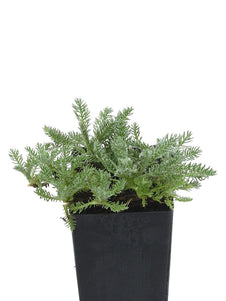
Yarrow Woolly
Yarrow Woolly

- Low stock - 2 items left
- Inventory on the way

Usually available: All year
Life cycle: Perennial
Height: 15 - 20cm
Position: Full sun
Soil preference: Well drained
This is how we pack and send your Herb Plants to all states except TAS & WA
You will receive
- 1 Yarrow Woolly Herb Plant in a 50 X 75mm tube - General growing instructions
All of our Herb Plants are grown organically with certified organic potting mixes and fertilizers
Botanical Name: Achillea tomentosa
Woolly Yarrow is an herbaceous perennial, growing from 15-20cm high and 20-30 cm wide. This is a dwarf species and can be thought of as a clump-like groundcover, due to its mat forming growth habit. The grey-green leaves are linear and finely divided with the fine hairs creating a woolly appearance. The leaves release a spicy aroma when crushed and have a felt or velvet like texture. The yellow flowers appear in early summer to autumn and grow from different points of the tall stalk, but end up forming a flat cluster or corymb at the top of the stalk. This means the flowers closer to the top have shorter to travel and therefore have shorter stems.
The scientific name for Woolly Yarrow is Achillea tomentosa, with the species name referring to the flattened or matted characteristic of the hairs on the leaves creating a felt like or woolly texture. Yarrow plants are in the Asteraceae family and belong to the Achillea genus, which has over 80 species. These plants live in native habitats across Europe and Asia, with some growing naturally in North America. Depending on the species, they range in height and have white, yellow, orange, pink, or red flowers held in a characteristic corymb or flat cluster at the top of the stem.
Alternative names for Achillea tomentosa include Golden Flowered Yarrow, Golden Fleece, ‘aurea’ and ‘yellow flowered’ woolly yarrow. The genus was named for Achilles who was said to have his soldiers use yarrow to treat their wounds, providing common names such as Soldier’s Woundwort, bloodwort or allheal. Many moths and butterflies appreciate this genus of plants and may use it as a source of food for their larvae. Bees find the Achillea species very attractive and most are long blooming. Moths and butterflies use these plants as a reliable food source.
Growing Conditions
Yarrow plants are some of the best plants for hot, dry positions in the garden. Woolly Yarrow likes full sun and may take part shade, is heat and drought tolerant, and requires average to low moisture. It is tolerant of a wide range of soils, from sand to clay but prefers gravelly loam. However, good drainage is essential because damp, clay soil will yield poor results. Woolly yarrow does not like humidity and can suffer powdery mildew. In regions with very cold winters, this plant may be deciduous or treated as an annual.
This plant takes some foot traffic, so it is ideal for gardens or rockeries which get climbed over by children or pets. It is recommended to divide these plants every 2-4 years. The clumps may be divided in early spring if you would like to propagate your own plants. Alternatively propagation may be via seed or rhizome. Dried flowers should be trimmed from the plant to facilitate a tidy appearance. Alternatively, the seed heads may be collected and the seeds dried for later use.
Medicinal Uses
Woolly Yarrow has a number of traditional medicine applications and a long history of external application to wounds. The whole plant may be harvested while in flower or the leaves may be picked just before flowering when they will have the strongest medicinal action. However, the flowers are said to be the strongest acting part of the plant. There have been over 100 active chemicals identified, including thujones, which may act internally or externally. Yarrow may be antiseptic, anti-bacterial, anti-inflammatory, potentially anaesthetic, analgesic, styptic (helps to stop bleeding), diaphoretic, astringent and anti-spasmodic. It is considered to be a good general tonic for both the cardiovascular system and gastrointestinal system.
Yarrow has also been used for fever, to induce sweating, common cold, hay fever, dysentery, diarrhoea, loss of appetite, gastrointestinal discomfort, and delayed or absent menstruation. It is sometimes used with other herbs for gastrointestinal complaints. Chewing fresh leaves is said to help relieve toothache. Yarrow leaves may be applied to the skin to help stop bleeding and also to heal the skin around wounds, to heal haemorrhoids, or used to create a sitz bath to help ease pelvic cramping. A tea infusion may also be made to be taken internally.
Yarrow has a wide range of potential medicinal actions and therefore may affect many regular medications. Please read through the material below to familiarise yourself with possible contraindications.
Yarrow contains chemicals that interact with blood clotting medication including aspirin, warfarin, ibuprofen and other medications. There are many medications taken for other purposes that may contain components that slow blood clotting, for example, Advil and Naprosyn. When taken while consuming yarrow, there may be increased chances of bruising and/or bleeding from minor injuries that would otherwise go unnoticed. Yarrow should not be taken in the two weeks before surgery due to the potential for interference with blood clotting processes.
Yarrow may act as a diuretic and care should be taken with medications such as Lithium which may not be excreted properly from the body creating an overdose risk. Yarrow may also cause sleepiness and drowsiness, so taking yarrow while using sedatives may increase this effect. Antacids may not be as effective as expected when taking yarrow. The yarrow plant contains chemicals that may increase stomach acids, which can contribute to reflux and heartburn symptoms. Blood pressure may also be affected by yarrow plants, so this should be considered when on blood pressure medication.
People with allergies to the Asteraceae/Compositae Family which includes the daisies and marigolds may find they experience allergic reactions to yarrow plants.
Pregnant and breastfeeding women should not use the yarrow plant for any purpose as it contains chemicals that affect the menstrual cycle and may induce miscarriage.
Culinary Uses
Woolly Yarrow may be used as a vegetable by including the young leaves and flowers in salads or by boiling the leaves. The leaf may also be used as a seasoning or to create a tea infusion. Yarrow has been used to flavour beer, wines and soft drinks as long as the resulting beverage remains thujone free.
Other Uses
Yarrow flowers are long lasting in a vase and may also be cut and dried to good effect. The flowers also yield a light green coloured dye.
All information provided on this website is for informational purposes only. Please seek professional advice before commencing any treatment.





